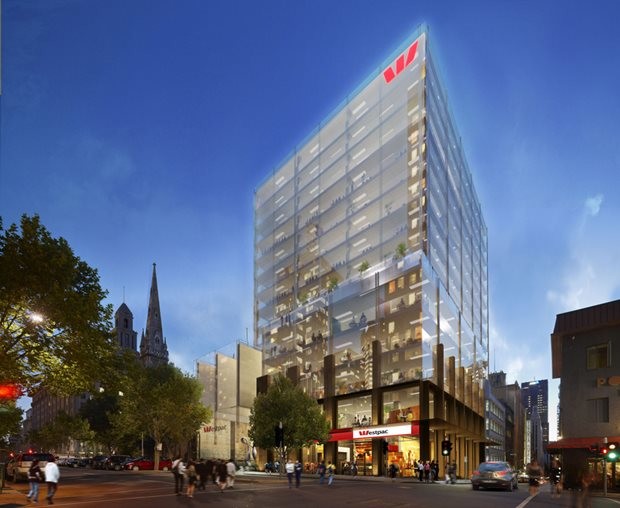[Update] Scroll down to comments field below for a consultant's explanation of the irregular iridescent blue streaks and perimeter bands visible from street level. And further insights into glazing fails.
On 16 June, the Construction Forestry Mining and Energy Union (CFMEU) released a statement claiming that a Grocon project at 150 Collins Street, Melbourne would have to replace $18 million worth of sub-standard glass.
The glass came from Chinese supplier China Southern Glass and was described by CFMEU National Secretary as substandard and low quality when compared with local Australian glass.
“Had Grocon chosen better quality local glass to begin with, not only would it have created more local jobs but it could have avoided this expensive mess,” said CFMEU National Secretary, Michael O’Connor.
“Sub-standard imported building products are flooding the market. Regulators are asleep at the wheel and too many developers are choosing cheap and dangerous over quality and safety.”

In an interview with Architecture and Design, Grocon spokesman Dan Blyde emphasised that the choice of glass manufacturer for the 150 Collins Street building was not their own and that China Southern is a reputable source.
“Grocon did not choose the glass or the supplier. The glass was specified by the project architects. We understand the architects specifically chose the glass having seen the same product from China Southern used in the Lend Lease Lacrosse Docklands project,” said Blyde.
“China Southern Glass is one of the largest international suppliers of glass and has a reputation for supplying a broad range of high quality products. China Southern is well known and is widely used by the major builders and developers in Australia. We understand it is the principal supplier of glass for the Barangaroo Project.”
Grocon would not comment on the cost for replacing the glass, but was specific about what had to be replaced.
“The vision panels to the glass are being replaced due to their exhibiting blue streaks in polarised light conditions,” said Blyde.
“They are far more apparent in clear sunlight rather than overcast or shaded conditions. The clients were not happy with that appearance and Grocon is replacing those panels. The spandrel panels do not require replacement.”

^The $180-million Collins Street project includes 20,500 sqm of accommodation over 13 floors.
While CFMEU did not explicitly claim that the 150 Collins Street building fell short of Australia’s National Construction Codes, they did reference a report from the Australian Industry Group showing that nearly all building and construction businesses had substandard products in their supply chains.
“A recent report by the Australian Industry Group found that 92 per cent of building and construction businesses had substandard products in their supply chains, and nearly half (45 per cent) had suffered financially because of such products. Products that do not meet National Construction Code standards are widespread across the building and construction sector, especially steel, electrical, glass, timber and aluminium products, according to the report,” said the CFMEU.
In response, Grocon says that the China Southern vision panels used in the project were not a part of this statistic.
“The specified glass that was chosen meets all relevant Australian codes, building standards and performance criteria,” said Blyde.
Blyde did not explain which of the Australian codes were relevant nor did he highlight which building standards and performance criteria the vision panels met.
Irrespective of the 150 Collins Street glass problems, the Australian Industry Group reports a troubling trend that the CFMEU says has resulted in unnecessary problems around the country.
“Around the country, the use of substandard building materials has resulted in expensive and potentially dangerous safety and quality compromises.”
These include:
-
The 200 panes of glass which have fallen from the Waterfront Place building in Brisbane
-
The ASIO Government building in Canberra which lost some 21 panels
-
The windows which had to be replaced in a 24-storey development in Perth with conforming products
-
Melbourne's 'Melburnian' apartment block, which faced a repair bill of $9 million after nine panels of glass failed
The CFMEU is now calling on the Federal Government to honour its election commitment to ensure imported building products comply with Australian Standards.
The Senate inquiry looking into Commonwealth Procurement Procedures is due to report on June 30.
“Construction sites are already dangerous enough without workers having to handle potentially dangerous building materials. A building worker is seriously injured or killed every nine minutes in this country. We will always take a stand so that our members come home safe at the end of the day,” O’Connor said.
Images: Grocon

